Protecting the Madre de Dios forest that gives us water
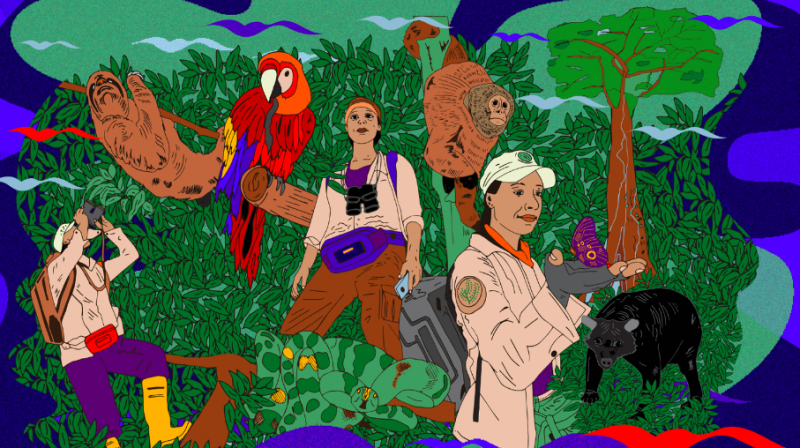
The Madre de Dios rainforest in Peru is one of the most diverse forests on the planet and is also one of the most threatened ecosystems in South America by illegal logging and gold mining. During the pandemic, the pressure from the timber industry has continued to increase, agricultural activities are expanding and trees are being cleared to make way for new roads. This growing pressure threatens people who are promoting sustainable management and conservation of the forest, such as the Association for the Resilience of the Forest against the Interoceanic (ARBIO) and its leaders, sisters Tatiana and Rocío Espinosa.
ARBIO has inventoried more than 400 large trees in danger of illegal logging. The association is dedicated to caring for 916 hectares of this natural forest in Madre de Dios that houses the Shihuahuaco trees, a species that lives more than 1000 years and is in danger due to the increase in its extraction for the parquet floor industry. Currently, 85 percent of all Shihuahuaco wood that leaves Peru comes from Madre de Dios, and most of the wood exported by Peru has an unknown or illegal origin.
The association monitors other Amazonian trees, whose age is calculated between 100-1400 years, due to the high value they contribute to the ecosystem. Not only do these trees in ARBIO’s forest provide an important shelter and source of food for animals, together they have also sequestered more than 100,000 metric tons of carbon. The large hardwood trees alone, such as the Shihuahuaco and the Quinilla that are being indiscriminately cut down, store around 10-35 tons of carbon — proving to play a crucial role in curbing climate change.
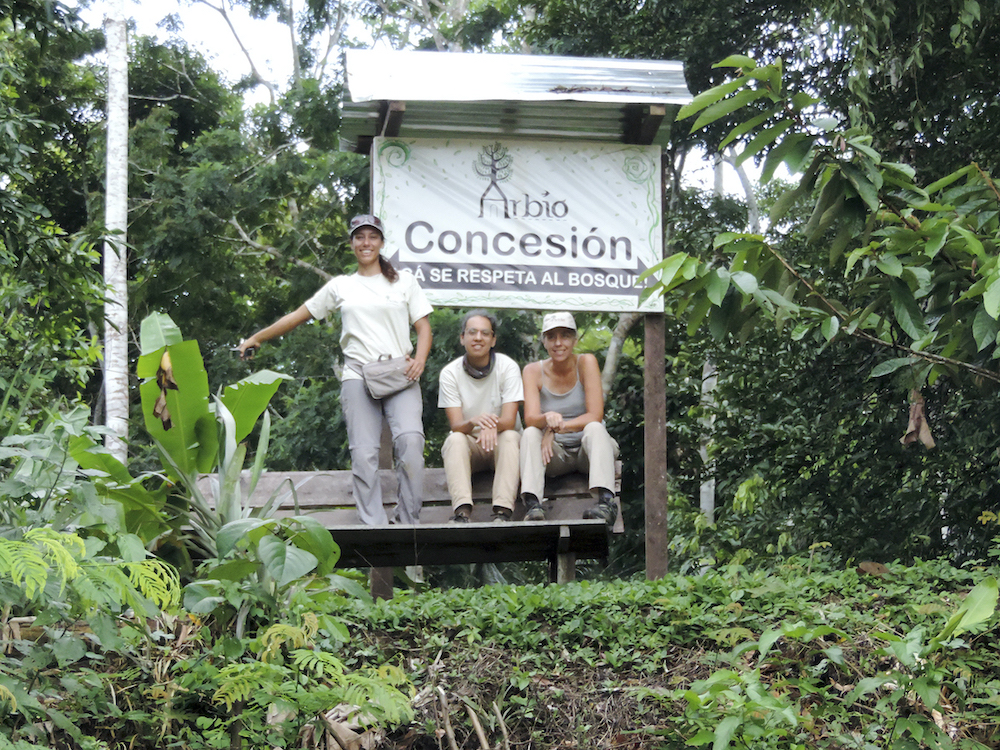
They also play a fundamental role in the water cycle, each pumping around 1,000 liters of water per day from the subsoil to the atmosphere, promoting the formation of clouds by evapotranspiration. This creates a great flow of humidity called “flying river” that transports the water towards the Andes, moving more water than the Amazon River itself. This water feeds the glaciers and snow-capped mountains that melt into rivers and make up the water reserves of South American coastal cities and dry highlands. Millions of people and industries depend on this water from the Amazon rainforest.
ARBIO was founded in 2010 to demonstrate that coexisting with the forest is possible and that by involving people in its protection, conservation activities can be sustainable over time. They train representatives of local communities in forest conservation and protection activities. They call it “shared conservation.”
ARBIO also trains community members in Analog Forestry, a methodology that is based on restoring the forest by imitating its natural conditions. Analog Forestry generates benefits such as reducing pests and obtaining organic products, unlike monocultures that rapidly impoverish the ecosystem. It can also support communities with their livelihoods, such as jewelry-making out of palm tree and Shihuahuaco seeds. ARBIO signed an agreement with the Native Federation of Madre de Dios for the development of the project “Sustainable jewelry for conservation” to involve young people from Indigenous communities.
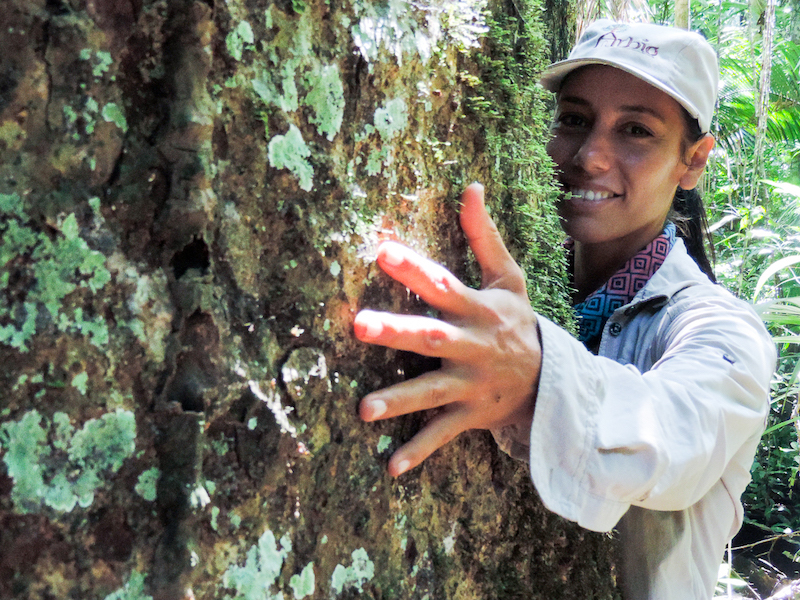
In December 2020, the forest ARBIO takes care of was categorized as a “Fragile Ecosystem” by the National Forest and Wildlife Service of Peru’s Ministry of Agrarian Development and Irrigation. This means it’s a priority area for the conservation of biodiversity and providing ecosystem services such as carbon capture and its role in the water cycle.
With this categorization, ARBIO calls on regional and local authorities to carry out special management for the forest’s protection. This includes the execution of forest control, supervision, inspection and surveillance actions in accordance with the Inter-Institutional Action Protocol to manage and protect the ecosystems included in the List of Fragile Ecosystems of Peru.
ARBIO and local partners have come together to collect evidence of illegal activities in the field such as hunting, illegal logging and mining, and create reports demanding relevant action from the authorities. It is working with the Ministry of the Environment and the Environmental Crimes Prosecutor’s Office.
For Tatiana, the health and supply of water depends on the health of the forest. She said, “The Amazon provides us with water. Conserving the forest is a better business than degrading it.”
ARBIO is a partner of the International Analog Forestry Network which is part of the Global Alliance for Green and Gender Action network. To learn more about ARBIO’s work, click here.
Illustration by Naadira Patel @studiostudioworkwork.
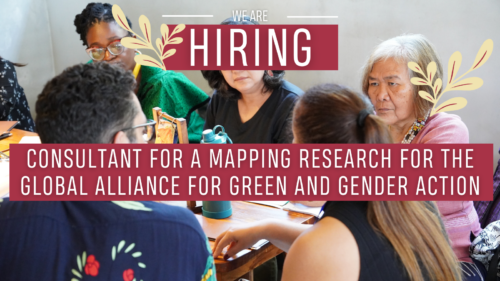
We Are HIRING: Consultant for a Mapping Research for the Global Alliance for Green and Gender Action
The Global Alliance for Green and Gender Action (GAGGA) is seeking a consultant to conduct Mapping Research aimed at identifying…
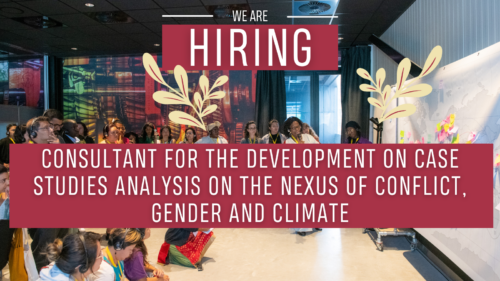
We Are HIRING: Consultant for the development on Case Studies Analysis on the nexus of Conflict, Gender and Climate
The Global Alliance for Green and Gender Action (GAGGA) is seeking a consultant to develop case studies and analysis on…

Report: Seeds for Harvest – Funding for Gender, Climate, and Environmental Justice
The world has drastically changed in recent years, from the COVID-19 pandemic and ongoing conflicts to the rise of authoritarianism…
Subscribe to our newsletter
Sign up and keep up to date with our network's collective fight for a gender and environmentally just world.
